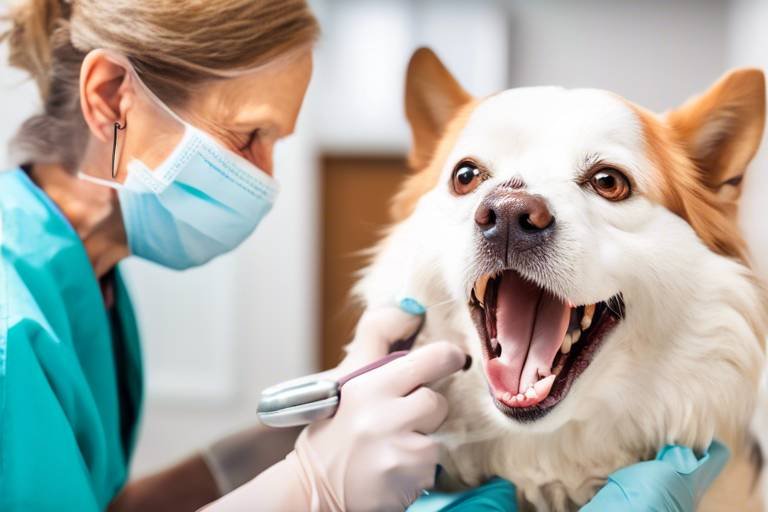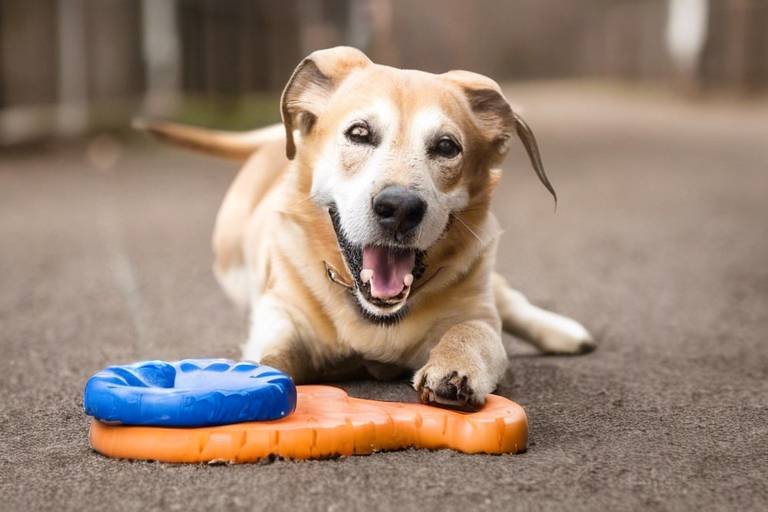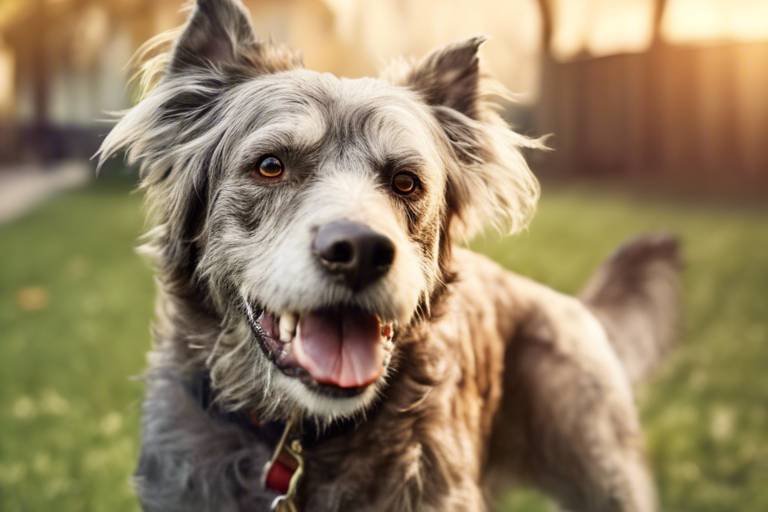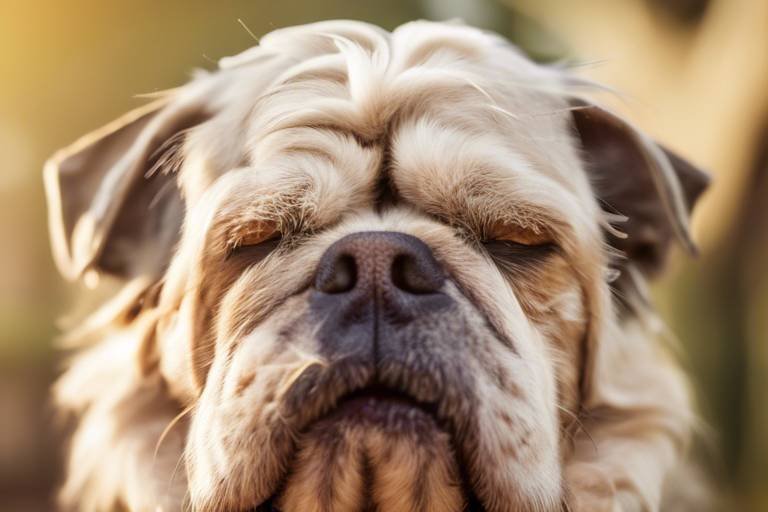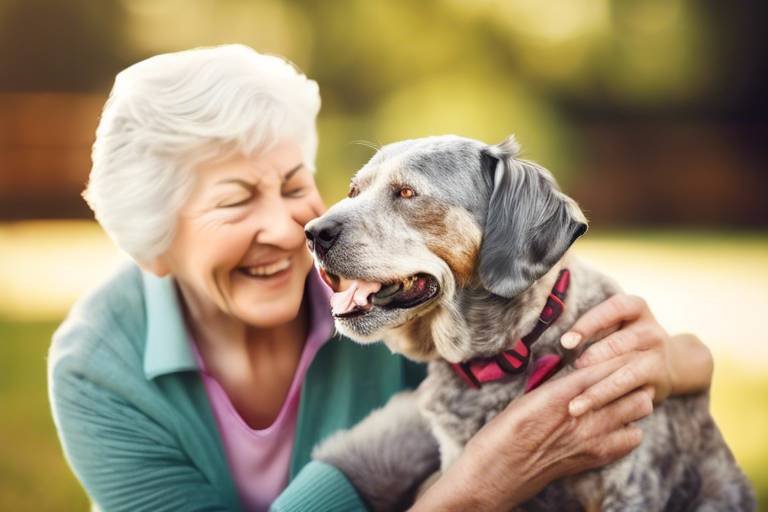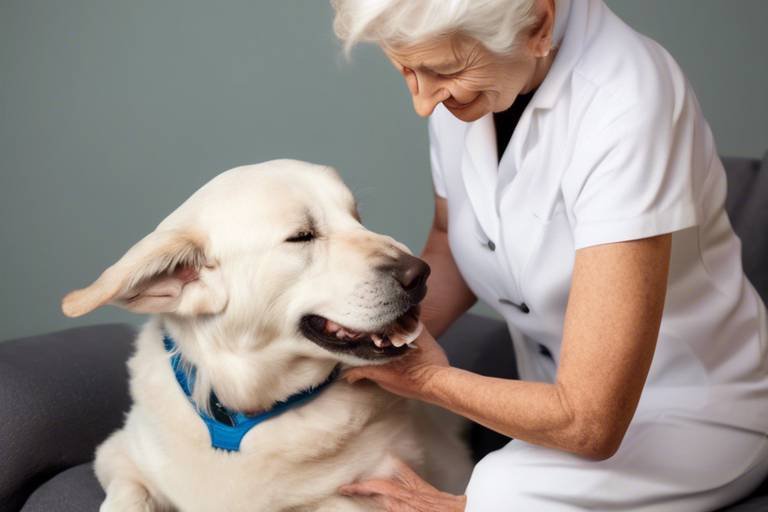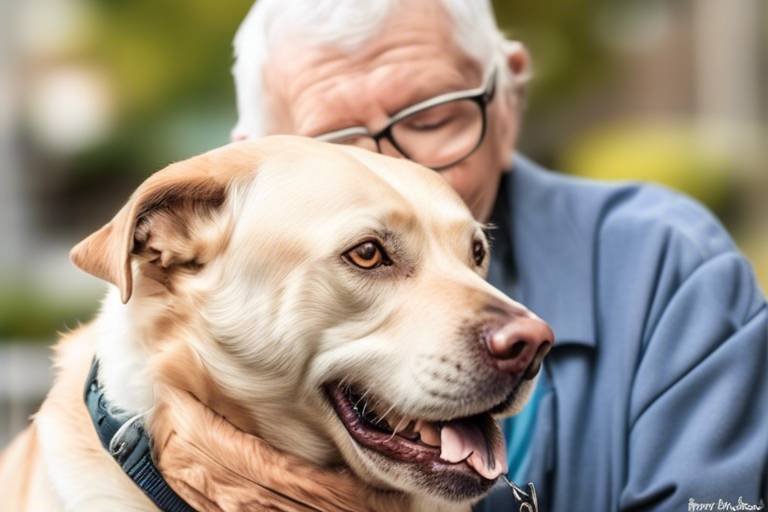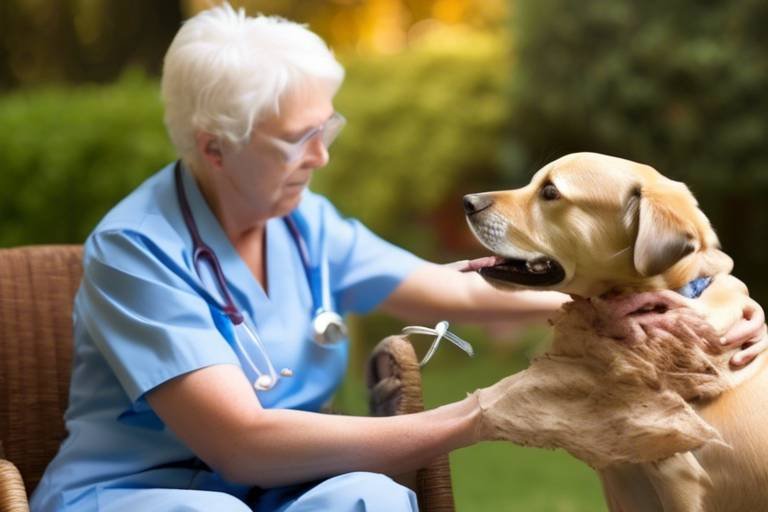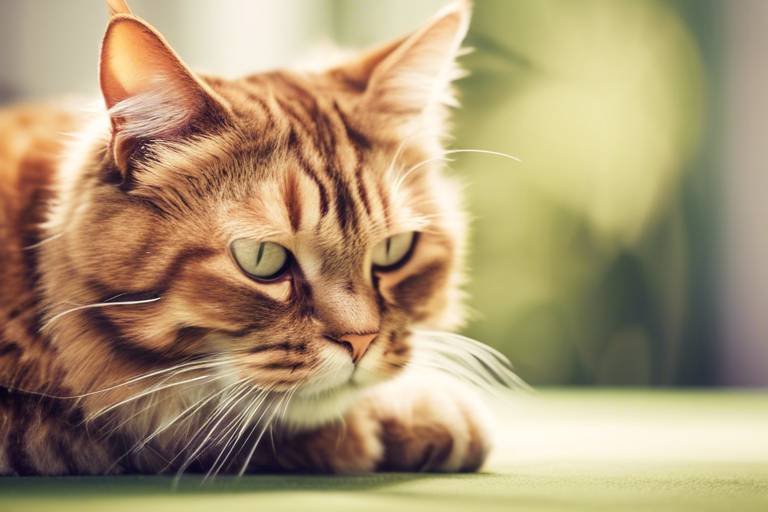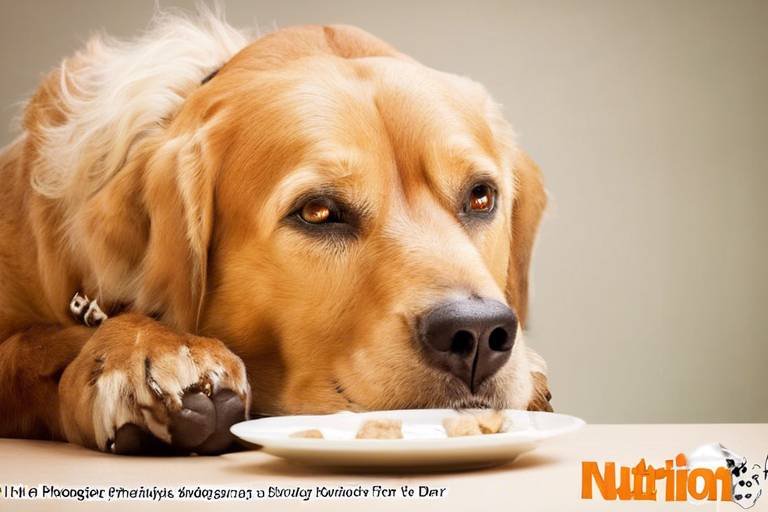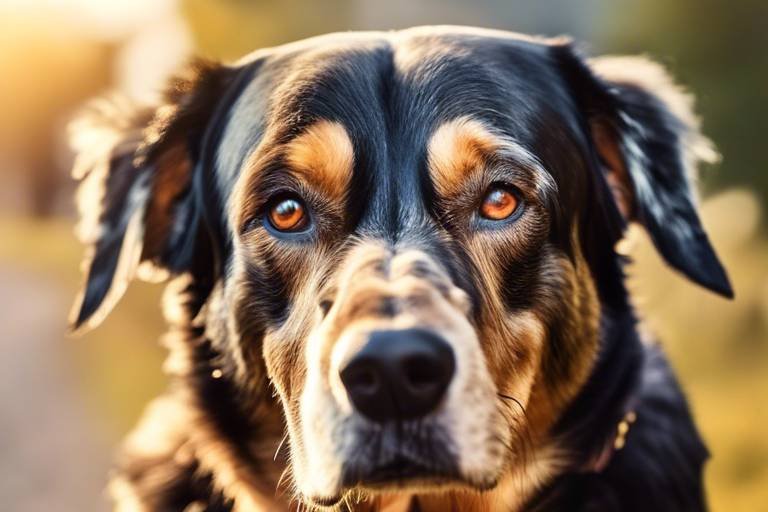The Benefits of Routine Dental Cleanings for Senior Pets
As our beloved furry friends age, their health needs evolve, and one of the most crucial aspects of their well-being is often overlooked: dental health. Just like humans, pets can suffer from a variety of dental issues that can impact their overall health. This article explores the importance of regular dental cleanings for senior pets, highlighting how they contribute to overall health, prevent dental diseases, and enhance the quality of life for aging animals.
Dental health is not just about having a bright smile; it’s a cornerstone of your pet’s overall health. Senior pets are particularly vulnerable to periodontal disease, which can lead to pain, infection, and even systemic health problems. Regular dental cleanings are vital as they help identify and address dental issues before they escalate into serious health problems. Imagine your pet's mouth as a garden; without regular maintenance, it can quickly become overrun with weeds (or in this case, plaque and tartar). Keeping that garden tidy through routine cleanings ensures your pet remains healthy and happy.
As pets age, they may experience a variety of dental issues, including:
- Tartar Buildup: This hard substance can lead to gum disease if not removed.
- Gum Disease: Inflammation and infection of the gums can cause pain and tooth loss.
- Tooth Loss: Missing teeth can affect your pet’s ability to eat and enjoy food.
Understanding these common problems can help pet owners take proactive measures to maintain their pet's dental health. Just like we schedule regular check-ups for ourselves, our pets deserve the same level of care.
Recognizing the signs that your senior pet may need a dental cleaning is essential. Look out for:
- Bad Breath: This could indicate underlying dental issues.
- Difficulty Eating: If your pet struggles with their food, it might be due to dental pain.
- Swollen Gums: Inflammation is a clear sign that dental care is necessary.
Being vigilant about these signs can help you catch potential problems early, preventing them from developing into more serious issues.
Regular veterinary checkups play a vital role in maintaining your pet's dental health. During these visits, vets can assess oral hygiene and recommend appropriate cleaning schedules based on your pet's needs. Think of your vet as a skilled gardener, tending to the health of your pet’s mouth garden. They can spot the weeds before they take over, ensuring your pet stays healthy and vibrant.
In addition to professional cleanings, at-home dental care is crucial for senior pets. Simple practices such as:
- Brushing: Regular brushing can significantly reduce plaque buildup.
- Dental Treats: Specially designed treats can help clean teeth and freshen breath.
- Water Additives: These can help reduce bacteria in your pet's mouth.
can help maintain oral hygiene between vet visits. Just like we wouldn’t rely solely on a dentist for our oral health, your pet needs your help too!
Routine dental cleanings not only improve oral health but also contribute to the overall well-being of senior pets. Healthy teeth and gums can prevent systemic health issues related to dental disease, such as heart and kidney problems. Think of your pet’s mouth as the gateway to their body; if that gateway is compromised, it can lead to a host of other health issues. Investing in dental cleanings is like fortifying that gateway, ensuring your pet can enjoy life to the fullest.
While the cost of dental cleanings may seem high, the long-term savings on potential health issues and treatments can outweigh the initial expense. Investing in dental care is an investment in your pet's health. Just like putting money into a savings account, spending on preventive care can save you from larger expenses down the road.
Many veterinary clinics offer payment plans or dental care packages to make routine cleanings more affordable. Researching local options can help pet owners find the best care for their senior pets. Don’t hesitate to ask your vet about financing options; they want to help you keep your pet healthy without breaking the bank.
Anesthesia is often necessary for dental cleanings in senior pets. Understanding the safety protocols and monitoring procedures can help alleviate concerns about anesthesia during dental care. Your vet will ensure that your pet is closely monitored during the procedure, making it as safe as possible. Think of it as a protective blanket; it’s there to keep your pet safe and comfortable while their dental needs are addressed.
Q: How often should I get my senior pet's teeth cleaned?
A: It’s generally recommended to have professional dental cleanings at least once a year, but your vet may suggest more frequent visits based on your pet’s specific needs.
Q: Can I brush my pet's teeth at home?
A: Absolutely! Regular brushing at home can significantly improve your pet's dental health. Just make sure to use toothpaste specifically designed for pets.
Q: What are the risks of dental cleaning under anesthesia?
A: While there are always risks associated with anesthesia, your vet will take necessary precautions to ensure your pet's safety. They will conduct pre-anesthetic tests to assess your pet's health before the procedure.
Q: Are dental treats effective?
A: Yes, dental treats can be an effective way to help reduce plaque and tartar buildup, but they should not replace regular dental cleanings.

Understanding Dental Health in Senior Pets
Dental health is a critical aspect of overall wellness for senior pets, and it becomes increasingly important as they age. Just like humans, our furry friends can face a myriad of dental issues that can lead to significant discomfort and even serious health complications. As pets grow older, their susceptibility to periodontal disease increases, making regular dental cleanings essential in maintaining their quality of life. But why is dental health so crucial for our senior companions? Well, consider this: the mouth is the gateway to the body, and any infection or disease in the oral cavity can have far-reaching effects on a pet's overall health.
Regular dental cleanings not only help to prevent bad breath and keep those pearly whites shining, but they also play a vital role in identifying potential health issues before they escalate. During a dental cleaning, veterinarians can examine the gums and teeth closely, looking for signs of tartar buildup, gum disease, or even tumors. These early detections can save your pet from painful procedures or serious health problems down the line. Imagine if you could catch a health issue before it becomes a crisis—this is precisely the advantage that regular dental check-ups provide.
Additionally, maintaining good dental hygiene can prevent bacteria from entering the bloodstream, which can lead to systemic health problems affecting vital organs such as the heart and kidneys. According to various studies, pets with poor dental health are more likely to develop conditions like heart disease and kidney failure. Therefore, investing in routine dental care is not just about keeping your pet's mouth clean; it’s about ensuring their overall health and longevity.
In summary, understanding the importance of dental health in senior pets is crucial for any pet owner. Regular dental cleanings can help keep your pet free from pain, prevent serious health issues, and enhance their quality of life. Remember, a healthy mouth often equates to a happy pet! So, don't wait for the signs of dental distress to show up; be proactive and schedule those regular cleanings!
- How often should I take my senior pet for dental cleanings? - It's generally recommended to have dental cleanings done at least once a year, but your veterinarian may suggest more frequent visits based on your pet's specific needs.
- What signs indicate that my pet needs a dental cleaning? - Look out for bad breath, difficulty eating, swollen gums, and excessive drooling. If you notice any of these signs, it's time for a vet visit!
- Are dental cleanings safe for senior pets? - Yes, dental cleanings are safe for senior pets, especially when performed by a qualified veterinarian who follows safety protocols and monitors your pet during the procedure.
- Can I perform dental care at home? - Absolutely! Regular brushing, dental treats, and water additives can help maintain your pet's oral hygiene between professional cleanings.
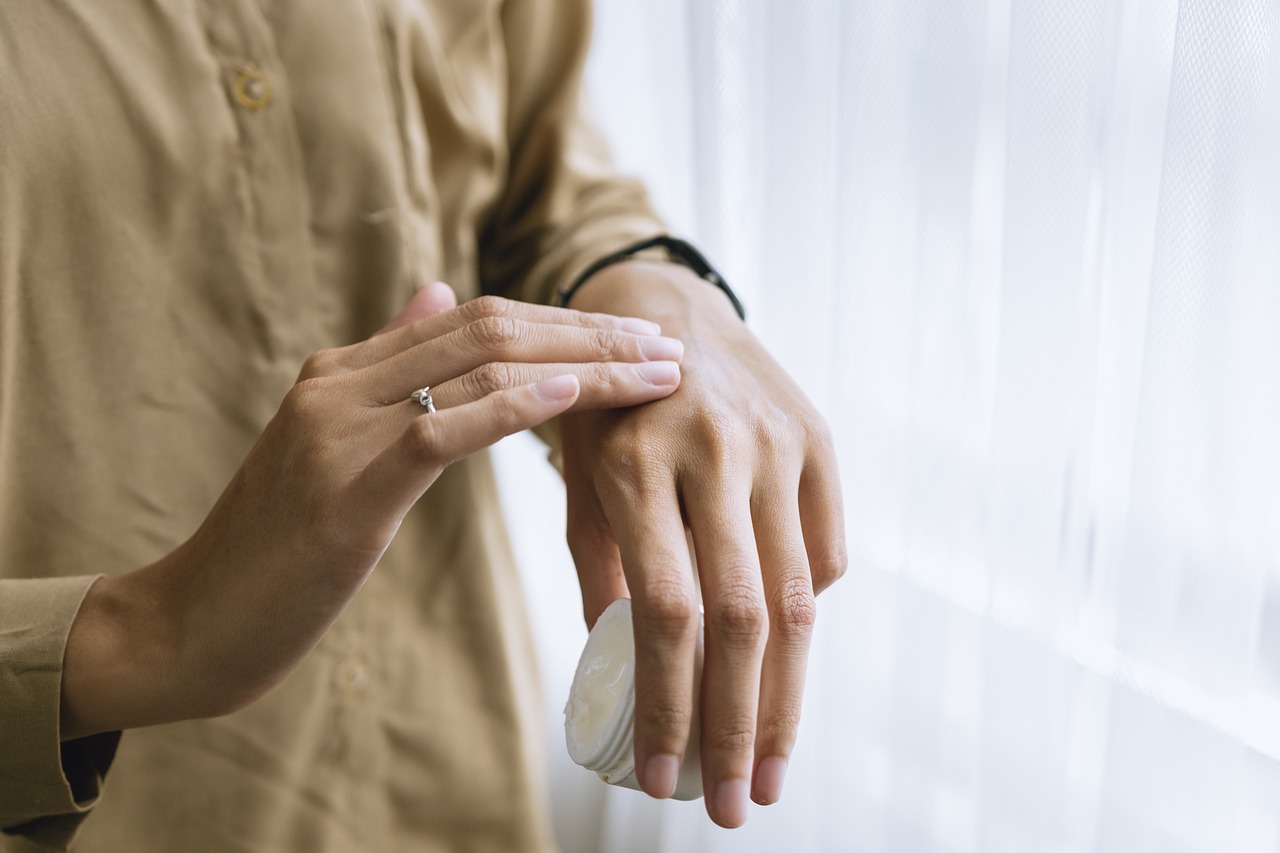
Common Dental Issues in Older Pets
As our beloved furry friends age, their dental health becomes a critical aspect of their overall well-being. Just like humans, senior pets face a myriad of dental issues that can affect their quality of life. One of the most prevalent problems is tartar buildup, which occurs when plaque hardens on the teeth. This buildup can lead to more serious conditions like gum disease, which is characterized by inflammation and infection of the gums. If left untreated, gum disease can progress to tooth loss, making it painful for pets to eat and enjoy their favorite treats.
Another common issue is periodontal disease, which is particularly concerning in older pets. This disease affects the structures surrounding the teeth, including the gums and bone. Symptoms may include bleeding gums, persistent bad breath, and even changes in behavior, such as reluctance to chew or play. It's important for pet owners to recognize these signs early, as periodontal disease can lead to systemic health issues, affecting the heart, liver, and kidneys.
Additionally, senior pets may experience tooth fractures or tooth resorption, a painful condition where the tooth structure breaks down. This can lead to significant discomfort and may require veterinary intervention. To help you understand these issues better, here’s a quick overview in the table below:
| Dental Issue | Symptoms | Potential Consequences |
|---|---|---|
| Tartar Buildup | Yellow or brown stains on teeth, bad breath | Gum disease, tooth loss |
| Periodontal Disease | Bleeding gums, swollen gums, bad breath | Systemic health issues, tooth loss |
| Tooth Fractures | Pain while eating, sensitivity to touch | Infection, tooth loss |
| Tooth Resorption | Pain, difficulty eating, behavioral changes | Severe dental pain, potential tooth loss |
Understanding these common dental issues can empower pet owners to take proactive measures in maintaining their senior pet's dental health. Regular dental checkups and cleanings are essential, as they can help identify these problems early on, allowing for timely intervention and treatment. Remember, a healthy mouth often leads to a happy and active pet, so don’t hesitate to consult your veterinarian about your senior pet's dental care!
As pet owners, it’s natural to have questions about dental health for our aging companions. Here are some common queries:
- How often should my senior pet have dental cleanings? It's generally recommended that senior pets receive dental cleanings at least once a year, but your vet may suggest more frequent visits based on your pet's specific needs.
- Can I brush my pet's teeth at home? Absolutely! Regular brushing can significantly reduce plaque and tartar buildup. Use toothpaste specifically designed for pets.
- What signs indicate my pet needs immediate dental care? Look for signs like excessive drooling, difficulty eating, or severe bad breath. If you notice these symptoms, it's best to consult your veterinarian promptly.
Signs Your Pet Needs a Dental Cleaning
As a loving pet owner, it's essential to be vigilant about your furry friend's dental health, especially as they age. Just like humans, pets can suffer from a range of dental issues that can lead to discomfort and serious health problems if not addressed. So, how do you know when your senior pet needs a dental cleaning? Here are some telltale signs to watch out for:
First and foremost, bad breath is often the most noticeable indicator. If your pet’s kisses start to smell like something died, it’s time to take action! This foul odor usually signals the presence of plaque and tartar buildup, which can lead to more severe dental diseases. Another sign is difficulties with eating. If your pet seems hesitant to chew or is favoring one side of their mouth, they may be experiencing pain or discomfort due to dental issues. Remember, pets can’t tell us when something hurts, so observing their eating habits is crucial.
Additionally, swollen or bleeding gums are red flags that shouldn’t be ignored. Healthy gums should be pink and firm, not red and inflamed. If you notice any swelling or bleeding during your pet's regular grooming routine, it’s a clear sign that a dental cleaning is overdue. Excessive drooling can also indicate dental problems, as pets may salivate more when they are experiencing oral pain or discomfort. Keep an eye out for these signs, as they can help you stay one step ahead of potential dental issues.
Another important aspect to consider is your pet’s overall behavior. If they seem more irritable or withdrawn than usual, it could be due to dental pain. Just like we can get cranky when we have a toothache, our pets can feel the same way. Regularly observing your pet’s behavior and habits can help you catch dental issues early. If you notice any of these signs, don’t hesitate to schedule a dental checkup with your veterinarian. Remember, routine dental care is not just about keeping those pearly whites clean; it’s about ensuring your pet lives a happy and healthy life!
- How often should my senior pet have a dental cleaning? - It’s generally recommended that senior pets have a dental cleaning at least once a year, but your vet may suggest more frequent cleanings based on your pet’s specific needs.
- Can I perform dental cleanings at home? - While at-home care is important, it should complement professional cleanings. Regular brushing and dental treats can help, but they don’t replace the need for veterinary cleanings.
- Is anesthesia safe for my senior pet during dental cleanings? - Yes, when performed by a qualified veterinarian, anesthesia is safe for senior pets. Vets follow strict protocols to monitor your pet’s health throughout the procedure.
The Importance of Regular Vet Checkups
When it comes to keeping our furry friends healthy, regular veterinary checkups are absolutely essential, especially for our senior pets. Just like us, as pets age, their bodies undergo various changes, making them more vulnerable to health issues. Think of a vet visit as a health checkpoint; it's not just about getting a quick look at your pet's teeth or fur. It's a comprehensive assessment that can catch potential problems before they spiral out of control.
During these checkups, veterinarians can perform thorough oral examinations to assess your pet's dental health. They look for signs of periodontal disease, which is particularly common in older pets. This condition can lead to pain, loss of teeth, and even affect organs like the heart and kidneys if left untreated. By identifying issues early, vets can recommend appropriate dental cleanings or treatments, potentially saving your pet from unnecessary discomfort and expensive procedures down the line.
Moreover, regular vet visits provide an opportunity for pet owners to ask questions and gain insights into their pet's overall well-being. You might wonder, "Is my pet's weight normal?" or "What are the best dental care practices at home?" These visits are a goldmine of information that can help you make informed decisions about your pet's care.
It's also worth mentioning that many veterinary clinics offer wellness plans that include routine checkups, vaccinations, and even dental cleanings. This can make it easier for pet owners to manage their budget while ensuring their pets receive the necessary care. By investing in these plans, you're not just taking a step towards better dental health; you're enhancing your senior pet's quality of life.
In summary, regular veterinary checkups are vital for the ongoing health of senior pets. They serve as a proactive approach to prevent dental and other health issues, ensuring that your furry companion enjoys a longer, happier life. So, don’t wait for signs of trouble; schedule that vet appointment and give your pet the gift of health!
- How often should I take my senior pet to the vet? It's generally recommended to take senior pets for checkups at least twice a year, but your vet may suggest more frequent visits based on your pet's health.
- What are the signs that my pet needs a dental checkup? Look for bad breath, difficulty eating, swollen gums, or noticeable tartar buildup. These are all signs that your pet may need dental care.
- Are dental cleanings safe for senior pets? Yes, when performed by a qualified veterinarian, dental cleanings are safe. Vets take precautions, including monitoring anesthesia closely to ensure your pet's safety.
At-Home Dental Care Practices
When it comes to maintaining your senior pet's dental health, are essential. Just like humans, pets need regular attention to their oral hygiene to prevent serious dental issues down the line. You might be wondering, "What can I do at home?" Well, there are several effective strategies that can keep your pet's mouth clean and healthy between those all-important veterinary visits.
One of the best ways to start is by brushing your pet's teeth. It may sound daunting, but with the right tools and a little patience, it can become a part of your routine. Use a toothbrush specifically designed for pets and a toothpaste that is safe for them. Regular brushing can help remove plaque and prevent tartar buildup, which is crucial for avoiding gum disease. Aim for at least two to three times a week, but daily brushing is ideal. Remember, it’s all about making it a positive experience for your furry friend!
Another great addition to your at-home dental care routine is incorporating dental treats into your pet's diet. These treats are specially formulated to help reduce plaque and tartar as your pet chews. Look for products that have the Veterinary Oral Health Council (VOHC) seal of approval. Not only do these treats help with dental hygiene, but they also provide a tasty reward for your pet, making dental care feel less like a chore.
Lastly, consider using water additives that promote oral health. These products can be added to your pet's drinking water and work to reduce bacteria in the mouth, helping to freshen breath and prevent plaque buildup. It's an easy way to enhance your pet's dental care routine without much effort on your part. Just remember to choose products that are specifically designed for pets, as human mouthwashes can be harmful to animals.
In summary, maintaining your senior pet's dental health at home doesn’t have to be overwhelming. By incorporating brushing, dental treats, and water additives into your routine, you can significantly improve your pet's oral hygiene. Think of it as a team effort; you and your pet working together towards a healthier, happier life!
Q: How often should I brush my pet's teeth?
A: Ideally, you should brush your pet's teeth daily, but a few times a week can also be beneficial.
Q: Are dental treats effective?
A: Yes, dental treats can help reduce plaque and tartar buildup, but they should complement regular brushing.
Q: Can I use human toothpaste for my pet?
A: No, human toothpaste can be harmful to pets. Always use toothpaste specifically formulated for animals.
Q: How do I know if my pet needs a dental cleaning?
A: Signs include bad breath, difficulty eating, and swollen or bleeding gums. If you notice these symptoms, consult your veterinarian.
Benefits of Dental Cleanings for Overall Health
When it comes to our beloved senior pets, their health is often intertwined with their dental hygiene. You might be wondering, "How can a simple dental cleaning affect my pet's overall health?" Well, let’s dive into this important topic! Regular dental cleanings are not just about keeping those pearly whites shining; they play a significant role in preventing systemic health issues that can arise from poor dental care.
First and foremost, maintaining healthy teeth and gums can significantly reduce the risk of periodontal disease. This condition is more than just a mouth issue; it can lead to serious complications affecting the heart, liver, and kidneys. Imagine your pet's mouth as a gateway; if that gateway is compromised, harmful bacteria can enter the bloodstream, wreaking havoc on vital organs. This is why the importance of dental cleanings cannot be overstated!
Furthermore, routine cleanings can help prevent bad breath, which is often a sign of underlying dental issues. A fresh breath not only makes snuggles more enjoyable but also indicates that your pet is in good health. You don't want your furry friend suffering in silence due to dental pain or discomfort, which can often go unnoticed without regular checkups.
Did you know that dental health can also impact your pet's appetite? If your pet is experiencing discomfort from dental problems, they may shy away from their favorite treats. Regular cleanings ensure that their teeth are in tip-top shape, allowing them to munch happily on their food without any pain. This not only enhances their quality of life but also keeps their energy levels up, making them more playful and active.
Moreover, there’s a ripple effect to consider. Healthy dental hygiene can lead to fewer visits to the vet for serious health issues, which can save you time, stress, and money in the long run. Think of it as a proactive approach to your pet's health—an ounce of prevention is worth a pound of cure!
In summary, the benefits of regular dental cleanings for your senior pets extend far beyond a clean mouth. They contribute to:
- Reduced risk of periodontal disease
- Decreased incidence of bad breath
- Improved appetite and energy levels
- Lower veterinary costs over time
So, the next time you consider postponing that dental cleaning, think about all the ways it can positively impact your furry friend's overall health. Investing in their dental care is truly investing in their happiness and longevity!
Q: How often should I get my senior pet's teeth cleaned?
A: It's generally recommended to have your senior pet's teeth cleaned at least once a year, but this can vary depending on their specific dental health needs. Always consult your veterinarian for personalized advice.
Q: Are dental cleanings safe for older pets?
A: Yes, dental cleanings are safe for senior pets when performed by a qualified veterinarian. They will assess your pet's health and may conduct pre-anesthesia blood work to ensure safety.
Q: What can I do at home to maintain my pet's dental health?
A: Regular brushing, dental treats, and water additives can help maintain your pet's dental hygiene between professional cleanings. Make it a fun routine!

Cost Considerations for Dental Cleanings
When it comes to the health of our senior pets, cost considerations for dental cleanings can be a significant concern for many pet owners. It's natural to feel a bit overwhelmed when faced with veterinary bills, especially when you know that regular dental care is essential for your furry friends. However, think of it this way: investing in your pet's dental health is much like investing in your own health. Just as we visit the dentist to prevent future problems, routine dental cleanings can save your pet from experiencing painful dental diseases down the line.
While the upfront cost of a dental cleaning might seem steep, it’s important to consider the long-term benefits. Neglecting dental health can lead to serious complications, including heart disease, kidney issues, and infections that could require expensive treatments. In fact, untreated dental problems can become a much larger financial burden than the cost of routine cleanings. To illustrate this point, let’s take a look at a simple comparison:
| Dental Care Type | Estimated Cost | Potential Complications | Cost of Complications |
|---|---|---|---|
| Routine Dental Cleaning | $200 - $500 | None | N/A |
| Untreated Periodontal Disease | N/A | Heart Disease, Kidney Issues | $1,500 - $5,000+ |
As you can see, the cost of routine dental care is a small price to pay compared to the potential expenses associated with serious health issues. Additionally, many veterinary clinics offer payment plans or dental care packages that can help spread out the costs. It's worth asking your vet about these options to make dental care more manageable.
Another factor to consider is the age and health condition of your pet. Senior pets often require more frequent dental cleanings, which can add up. However, proactive dental care can prevent the escalation of dental diseases, ultimately saving you money in the long run. Regular check-ups allow vets to monitor your pet's oral health and recommend personalized cleaning schedules.
So, before you dismiss dental cleanings as an unnecessary expense, remember that they are a crucial part of your pet's overall health regimen. Think of it as a preventive measure that pays off in the long term, ensuring your furry friend enjoys a happy and healthy life.
- How often should senior pets have dental cleanings? Senior pets typically benefit from dental cleanings every 6 to 12 months, depending on their oral health status.
- Are there any risks associated with anesthesia during dental cleanings? While there are risks, modern veterinary practices have strict safety protocols to minimize them. Always discuss your concerns with your vet.
- Can I perform dental care at home? Yes! Regular brushing, dental treats, and water additives can help maintain your pet's dental health between professional cleanings.
Finding Affordable Dental Care Options
When it comes to maintaining your senior pet's dental health, cost can often be a significant concern for pet owners. However, there are numerous ways to find affordable dental care options that ensure your furry friend receives the necessary treatments without breaking the bank. First and foremost, it’s essential to shop around. Different veterinary clinics may offer varying prices for dental cleanings, so don’t hesitate to call multiple places to compare costs. Some clinics even have special promotions or discounts for new clients, which can significantly reduce your expenses.
Another option to consider is seeking out veterinary schools in your area. These institutions often provide dental services at a fraction of the cost, as students perform the procedures under the supervision of experienced veterinarians. This can be a win-win situation: you get quality care for your pet, and the students gain valuable hands-on experience.
Additionally, many veterinary clinics offer payment plans or financing options to help pet owners manage the costs of dental care. This can be particularly helpful for those who might face unexpected expenses. By spreading out the payments, you can ensure your pet doesn't miss out on essential dental cleanings due to financial constraints.
Furthermore, consider looking into pet insurance plans that cover dental procedures. While not all pet insurance policies include dental care, some do offer plans specifically tailored for dental health. This could be an excellent investment for the long-term health of your pet, especially as they age and require more frequent dental attention.
Lastly, don't overlook the importance of at-home dental care practices. Regular brushing, dental chews, and water additives can help maintain your pet's oral hygiene between professional cleanings, ultimately reducing the frequency of costly vet visits. By taking proactive measures, you can help your senior pet enjoy a healthier mouth and save on dental expenses in the long run.
- How often should I get my senior pet's teeth cleaned? It is generally recommended to have your senior pet's teeth cleaned at least once a year, but your veterinarian may suggest more frequent cleanings based on your pet's specific needs.
- Are there any risks associated with dental cleanings under anesthesia? While anesthesia always carries some risks, modern veterinary practices use advanced monitoring techniques to ensure the safety of your pet during dental procedures.
- Can I brush my pet's teeth at home? Yes, regular brushing at home is highly encouraged! It can significantly improve your pet's dental health and reduce the need for professional cleanings.
Understanding Anesthesia in Dental Procedures
When it comes to dental cleanings for senior pets, the mention of anesthesia can often raise eyebrows among pet owners. It's completely natural to feel a bit anxious about the idea of your beloved furry friend undergoing any procedure that involves anesthesia. However, understanding how anesthesia works and the safety protocols in place can help alleviate those concerns. Anesthesia is crucial for dental cleanings, especially in older pets, as it allows veterinarians to perform thorough examinations and cleanings without causing stress or discomfort to the animal.
Before the procedure, your veterinarian will conduct a comprehensive health assessment. This typically includes blood tests to evaluate your pet's organ function and overall health. These tests are essential, as they help identify any underlying issues that could affect how your pet reacts to anesthesia. Safety first! Your vet will use the results to tailor the anesthesia plan specifically for your pet's needs.
During the dental procedure, your pet will be closely monitored by trained veterinary staff. They will keep an eye on vital signs such as heart rate, respiratory rate, and oxygen levels. This monitoring is crucial because it ensures that your pet remains stable throughout the process. Many veterinary clinics use advanced equipment to track these vital signs, providing an extra layer of safety.
It's also important to note that modern veterinary anesthesia has come a long way. The medications used today are much safer and more effective than those of the past. Your veterinarian will choose the best combination of drugs to minimize risks while ensuring that your pet remains comfortable. In fact, many pets recover from anesthesia quickly and are back to their usual selves in no time!
Here are some key points to remember about anesthesia in dental procedures for senior pets:
- Pre-anesthetic evaluation: Always ensure your vet conducts a thorough health check before the procedure.
- Monitoring: Continuous monitoring during the procedure is essential for safety.
- Recovery: Most pets recover quickly from anesthesia, often returning to normal activities within hours.
In conclusion, while the idea of anesthesia can be daunting, the benefits of routine dental cleanings far outweigh the risks. By ensuring that your pet receives the necessary pre-anesthetic evaluations and by choosing a reputable veterinary clinic, you can rest assured that your furry friend is in good hands. After all, a healthy mouth contributes to a happy and vibrant life for your senior pet!
As a pet owner, you may have some lingering questions about dental procedures and anesthesia. Here are a few frequently asked questions to help clarify any doubts:
- Is anesthesia safe for senior pets? Yes, with proper evaluation and monitoring, anesthesia is generally safe for senior pets.
- How long will my pet be under anesthesia? The duration depends on the complexity of the dental cleaning, but most procedures take about 30 minutes to an hour.
- What should I do before the dental appointment? Follow your vet's instructions regarding food and water intake prior to the procedure.
- Can I stay with my pet during the procedure? Generally, owners are not allowed in the procedure room for safety reasons, but you can discuss any concerns with your vet.
Frequently Asked Questions
- Why is dental health important for senior pets?
Dental health is crucial for senior pets because they are more prone to periodontal disease, which can lead to serious health issues if left untreated. Regular dental cleanings help catch problems early, ensuring your furry friend stays healthy and happy.
- What are the common signs that my senior pet needs a dental cleaning?
Watch for signs such as bad breath, difficulty chewing, swollen or bleeding gums, and excessive drooling. If you notice any of these symptoms, it's time to schedule a dental cleaning with your vet.
- How often should I schedule dental cleanings for my senior pet?
It's generally recommended to have dental cleanings for senior pets at least once a year. However, your veterinarian may suggest more frequent cleanings based on your pet's specific needs and dental health.
- What at-home dental care can I provide for my senior pet?
At-home dental care is essential! You can brush your pet's teeth regularly, give dental treats designed to reduce tartar, and use water additives that promote oral hygiene. These practices can help maintain your pet's dental health between professional cleanings.
- Are dental cleanings expensive?
While the cost of dental cleanings can vary, investing in your pet's dental health can save you money in the long run by preventing more serious health issues. Many clinics offer payment plans or packages to help make it more affordable.
- Is anesthesia safe for my senior pet during dental procedures?
Yes, anesthesia is generally safe for senior pets when administered by a qualified veterinarian. They will take precautions to monitor your pet's health throughout the procedure, ensuring their safety and comfort.
- What are the long-term benefits of routine dental cleanings?
Routine dental cleanings can significantly improve your pet's overall health by preventing dental diseases, which can lead to systemic issues affecting the heart, liver, and kidneys. A healthy mouth contributes to a longer, happier life for your furry companion.

